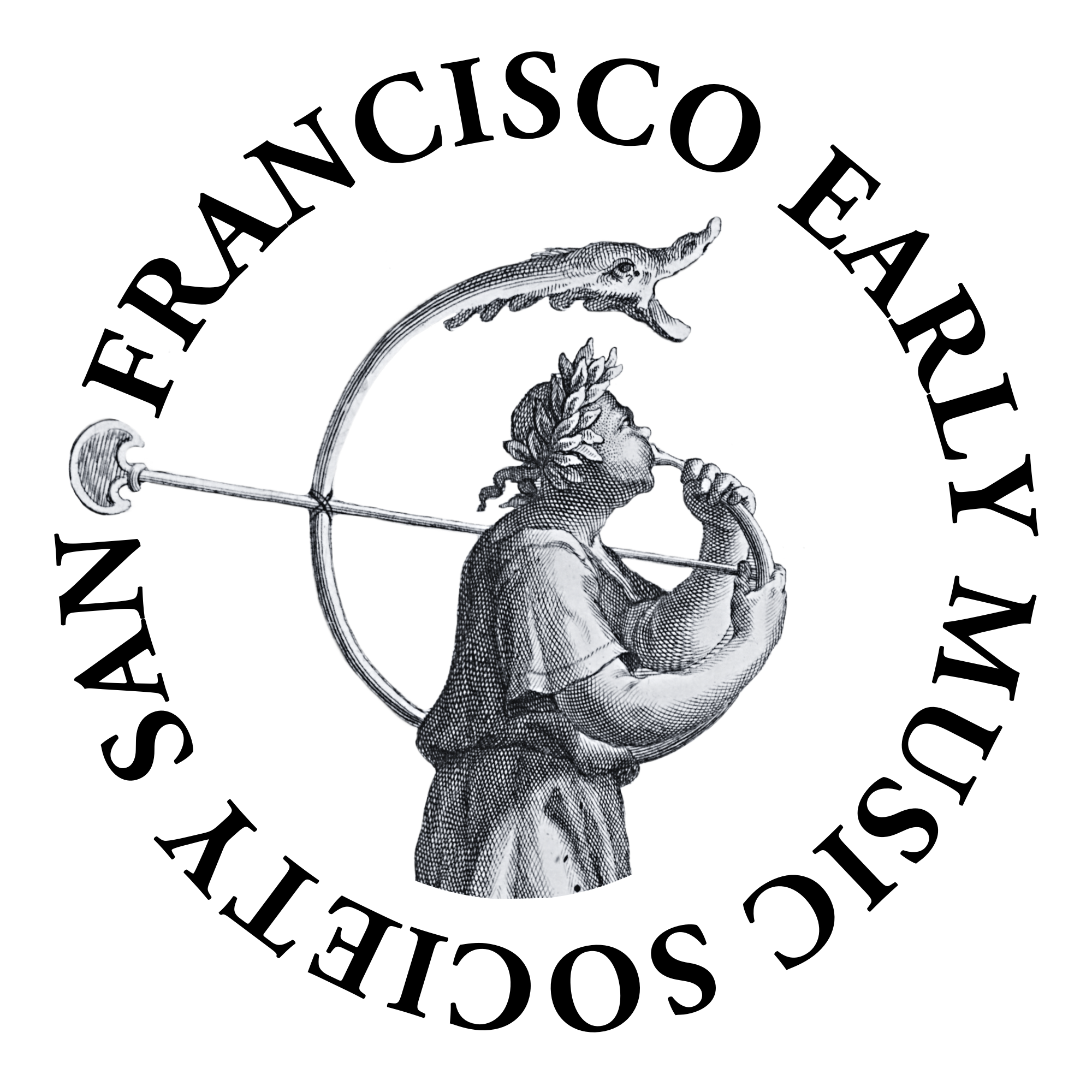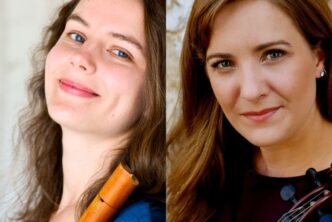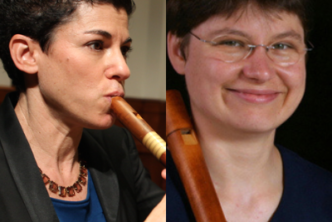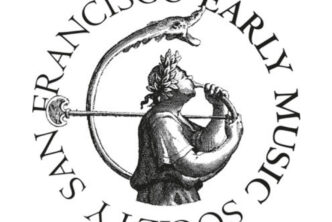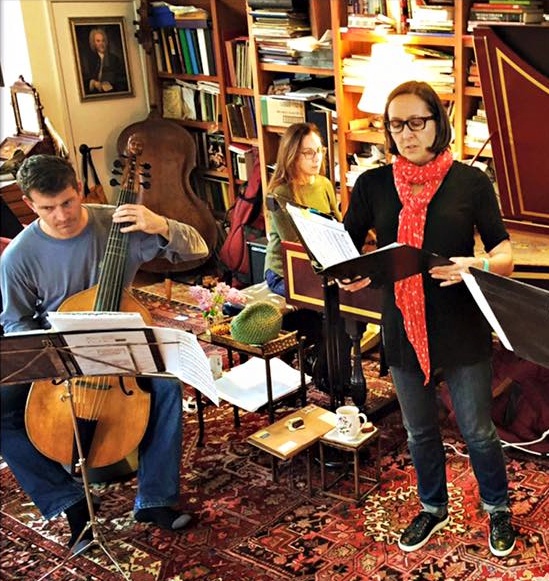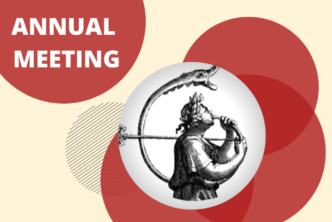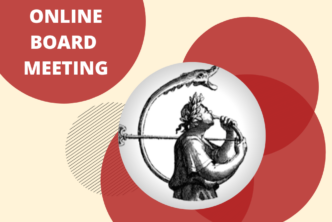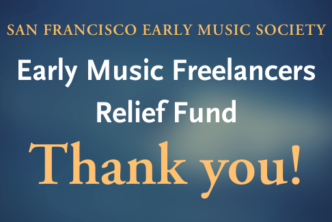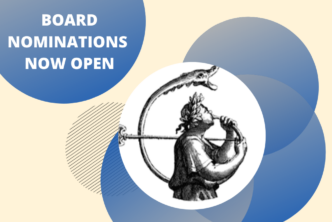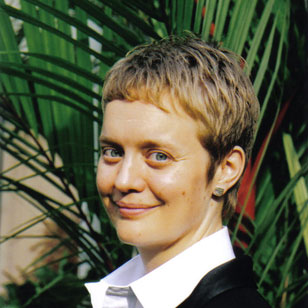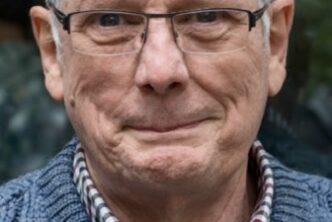Frances Feldon and Priscilla Winslow on a Quarter Century of Early Music
We continue our series on the paths that have led us to early music and the role SFEMS has played in our musical development. Frances Feldon and Priscilla Winslow have been involved with SFEMS for over 25 years. Frances, a baroque flutist and recorder player, has been a performer and teacher on recorder and historical flutes and was director of the SFEMS Recorder Workshop for two decades. Priscilla, an attorney and amateur recorder player, was president of SFEMS from 2005–2008. Jessica House Steward interviewed them at their home in Berkeley.
Jessica House Steward: When did you first fall in love with early music?
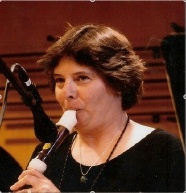 Frances Feldon: the very first memory I have of loving early music was when I was a teenager taking modern flute lessons and I was assigned one of the Bach flute Sonatas, the B Minor flute sonata, and I fell passionately in love with that piece. Then a little bit later in the summer before I started college, I went to an early music concert for the first time and I heard Leopold Stasny, who is kind of like one of the fathers of baroque flute playing in modern times, play the Bach B Minor Orchestral Suite with Concentus Musicus and I was just totally blown away by how beautiful the early flute was, and it was my Aha! moment-it was like, “That’s my instrument!”
Frances Feldon: the very first memory I have of loving early music was when I was a teenager taking modern flute lessons and I was assigned one of the Bach flute Sonatas, the B Minor flute sonata, and I fell passionately in love with that piece. Then a little bit later in the summer before I started college, I went to an early music concert for the first time and I heard Leopold Stasny, who is kind of like one of the fathers of baroque flute playing in modern times, play the Bach B Minor Orchestral Suite with Concentus Musicus and I was just totally blown away by how beautiful the early flute was, and it was my Aha! moment-it was like, “That’s my instrument!”
JHS: What was it about the B Minor flute sonata that resonated with you?
FF: That’s hard to explain because the connection is so visceral-that connection with early music idioms. Maybe it’s because they’re so intimate as well as being so passionate, at the same time, whereas with the symphonic 18th-century works there’s not that intimacy with the passion. I like both idioms, but for myself I feel more of a connection as a musician with the early music repertoire. Maybe it’s the intimacy.
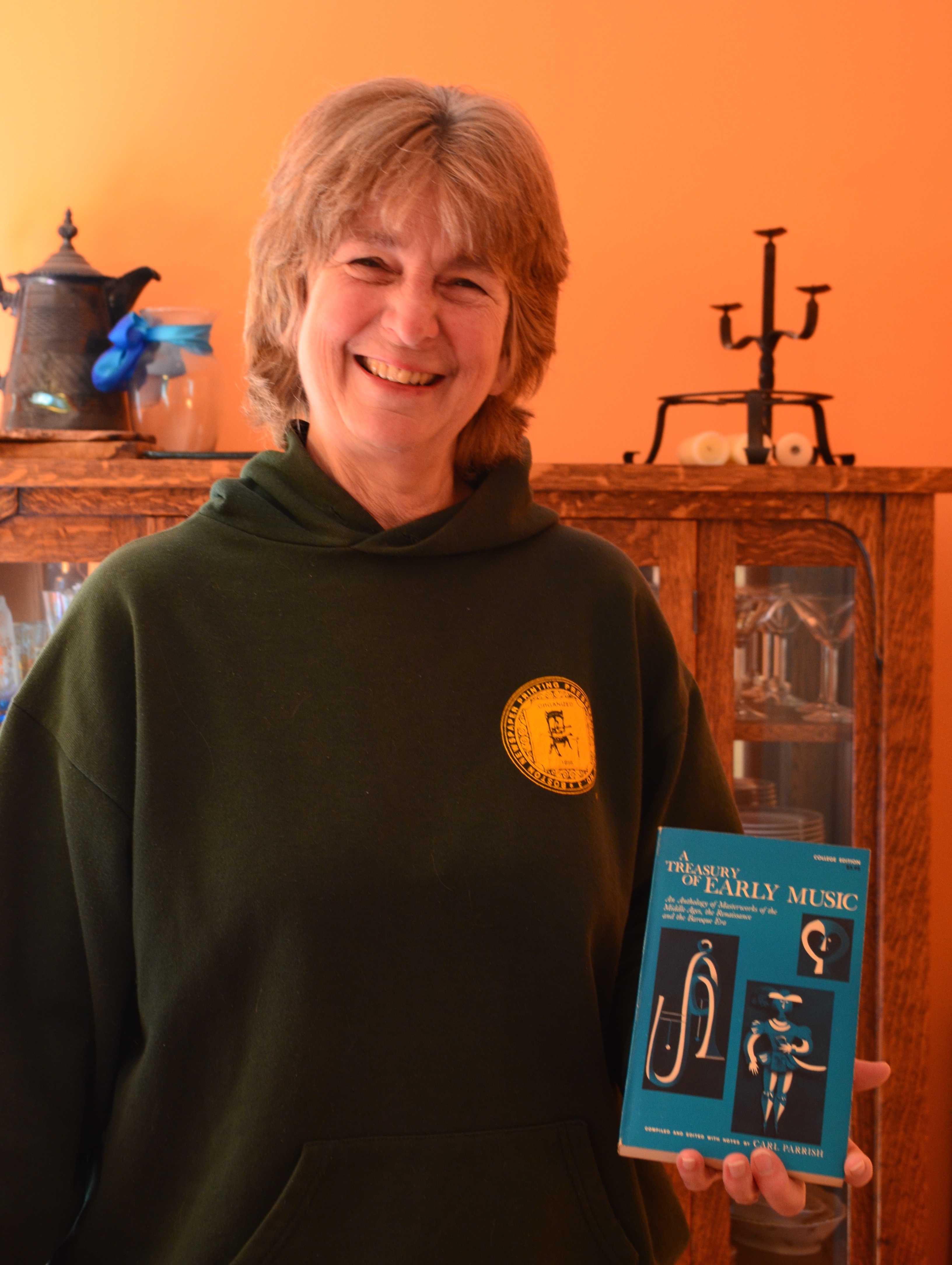 Priscilla Winslow: So, I’m an amateur musician. I’m not a professional, but the time frame for me is similar to Frances. I think it was when I was a teenager. I remember a few moments- when I was in high school, a history teacher played for us Bach ‘s Air on G string. But I was a classical music nerd before then. I was brought up by a professional ballet dancer and a father who was very interested in the 19th-century symphonic repertoire and all that, so I had classical music ringing in my ears throughout my childhood, but this Bach moment was really important because it was such a beautiful piece and it went to my heart. My mother, the ballet dancer, also somehow also got interested in early music. This was in the sixties, you know, so during revival of recorder playing, and she gave me a book on the history of medieval music that I still have, actually. We would listen to it together and it became sort of another part of my background. I really got interested in it in the early nineties when I when I heard Ensemble Alcatraz, and a friend of mine who lives in Australia was also interested in a parallel way in early music and she turned me on to Ensemble Alcatraz. And then I went to my first SFEMS Recorder Workshop in 1992 and this whole world opened up to me. Who knew there were so many recorder players in the Bay Area? There was this whole repertoire of early music that I had never heard before, or explored deeply, and being able to access it through playing it was such an important thing.
Priscilla Winslow: So, I’m an amateur musician. I’m not a professional, but the time frame for me is similar to Frances. I think it was when I was a teenager. I remember a few moments- when I was in high school, a history teacher played for us Bach ‘s Air on G string. But I was a classical music nerd before then. I was brought up by a professional ballet dancer and a father who was very interested in the 19th-century symphonic repertoire and all that, so I had classical music ringing in my ears throughout my childhood, but this Bach moment was really important because it was such a beautiful piece and it went to my heart. My mother, the ballet dancer, also somehow also got interested in early music. This was in the sixties, you know, so during revival of recorder playing, and she gave me a book on the history of medieval music that I still have, actually. We would listen to it together and it became sort of another part of my background. I really got interested in it in the early nineties when I when I heard Ensemble Alcatraz, and a friend of mine who lives in Australia was also interested in a parallel way in early music and she turned me on to Ensemble Alcatraz. And then I went to my first SFEMS Recorder Workshop in 1992 and this whole world opened up to me. Who knew there were so many recorder players in the Bay Area? There was this whole repertoire of early music that I had never heard before, or explored deeply, and being able to access it through playing it was such an important thing.
In what ways and how long have you been involved with SFEMS?
FF: Since I first moved to the Bay Area in 1989, I have been involved with SFEMS in a number of capacities. I was the director of the SFEMS Recorder Workshop for nearly twenty years, I founded and directed the Collegium Musicum, which ran for a half a dozen years or so, and then I was the director of The SFEMS adult night school classes. There was an education program and there were night school classes that SFEMS sponsored. Louise Carslake was the director of it before I was, and we met in the MusicSources building. I was the director for a few years, but that adult night school program was in existence probably for at least 10 or 12 years. There were recorder and baroque chamber ensembles, they offered private instrument lessons, I offered of course in reading original musical notation, and that’s just a few examples of the courses that there were. Oh, and I have always gone to SFEMS concerts as I’ve been able to.
Do you have any thoughts you want to share on the time that you spent as the Recorder Workshop Director; any pieces of that experience you’d like to share, or any windows into what happens at a recorder workshop or what you love most about it?
FF: Well, I think that the present directors, Hanneke [van Proosdij] and Rotem [Gilbert], have done a really fantastic job of leading the workshop and carrying on the traditions that I helped foster, but the person who was the director before I was whose name was David Barnett, also instituted some of the things that they’re still doing at the recorder Workshop. One of those things is, David Barnett founded the first ever recorder Orchestra as part of the summer workshop program, which is not to say that recorded orchestras haven’t been around but it was the first time that the recorder Orchestra was part of a summer workshop and it’s been carried through until this time. Now recorder orchestras are much more of an important part of the recorder community and the early music community. There are many recorder orchestras now days. It’s just lots of fun!
What are your SFEMS favorite memories?
FF: Well, I met my wife at the recorder Workshop 25 years ago. I won’t go into great detail about that, but it’s common that people meet their partners at early music workshops. Francis Blaker and Tish Berlin met at a SFEMS Workshop.
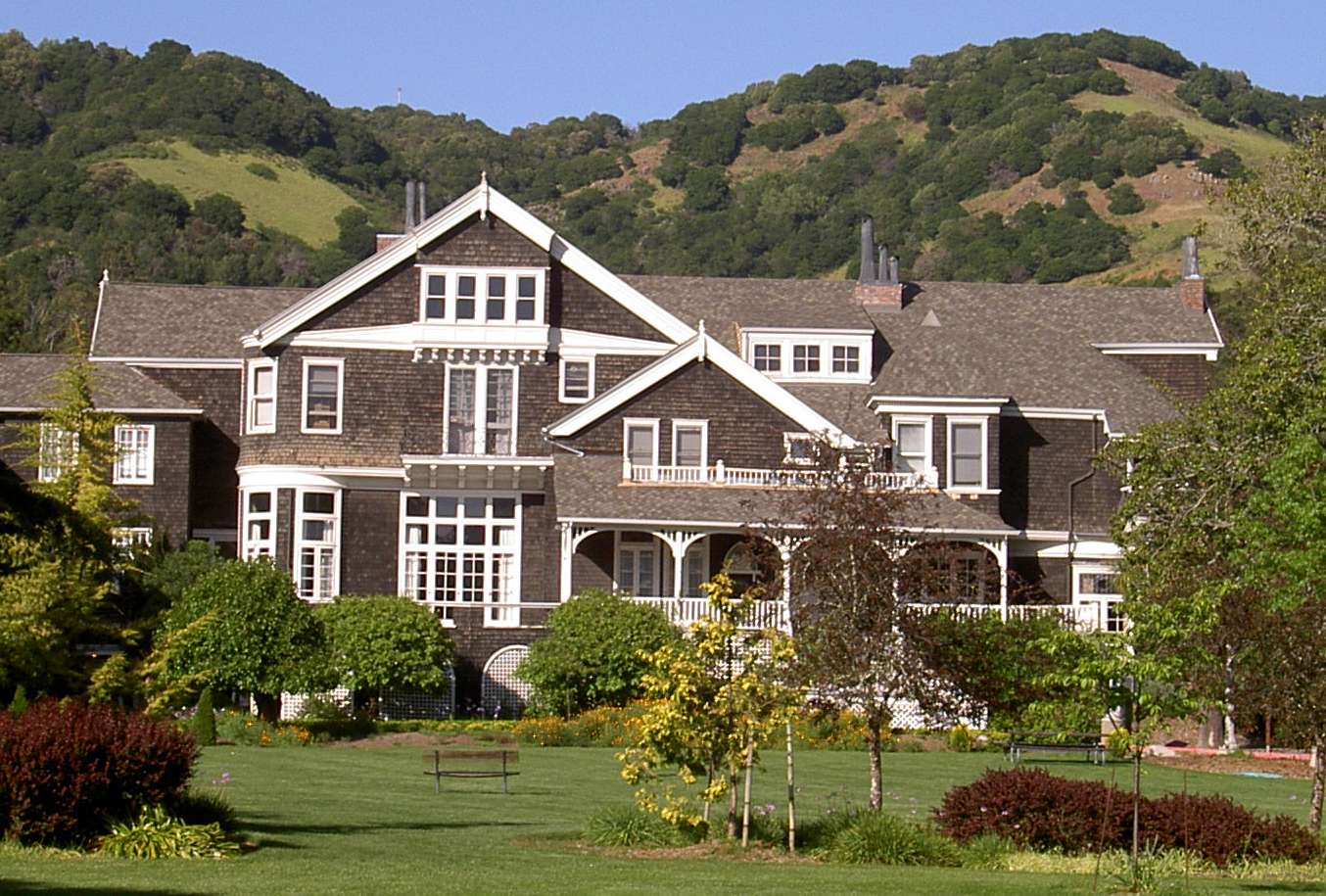
One of my favorite activities at the recorder Workshop used to be the Salmon Fest that we would do on Wednesday night. The Faculty would get together and cook for the participants, and create this beautiful feast with fresh whole salmon cooked on a BBQ and roasted potatoes and all kinds of delicious food. David Barnett started that and I continued doing that. Once we left Dominican College we couldn’t do it anymore because The Priory is not set up to have a barbecue. That was a favourite tradition. People got pretty happy, and in that inebriated state we would try to play croquet in the dark on the lawn in front of Meadowlands, which was pretty hilarious. As you can imagine, it was incredibly tough to play in the dark. Plus, the lawn certainly took a beating with all the foot traffic it experienced, but nonetheless, it was excellent fun. Thankfully, we knew the lawn could be replaced with the help of the trugreen pennsylvania office. After all, the lawn and landscaping on this property are breathtaking so it needs to be well looked after to maintain its beauty. I think that’s very typical of the spirit we had at the workshop then. It was a very warm community thing.
PW: One of the things about the workshops that was so special for me as an new attendee was that the participants were amazing people. Rose Miller, for example. We had characters. We had old lady characters who were just the most accomplished people…I mean men too, but just the most accomplished people and had the most interesting lives. Many of them have gone on now, but I used to say you meet the most interesting people playing recorder, and I think that the spirit that Frances is referring to was a synergistic thing with these participants who had such interesting personalities and passions. I’ve been a loyal participant of the recorder workshop, I was the president of the board for four years, 2003–2008, and I’m also a concert goer.
JHS: What’s your favorite SFEMS memory?
PW: It was at my first workshop, and I was not a good player; I had taught myself. There was a director, Ken Johnson, and he conducted a choral work by Isaac. Participants at the workshop took part and people from the community who were not workshop participants commuted just to come to that rehearsal. Jonathan Harris came and played cornetto. People just came for that one class to support Ken’s dream of putting together the forces of that piece. The way Ken did it, for the final performance, was that we were in a circle, and he conducted from the middle. He was at that point, sick-not so sick that he couldn’t conduct, but he was not as robust as he otherwise would have been. It was one of the two motets by Isaac, and it was a transcendent experience. Ken was so happy to hear that and have the music coming into the center. It was amazing to be a small part of that even if I missed my notes and couldn’t count. And that was at my first workshop.
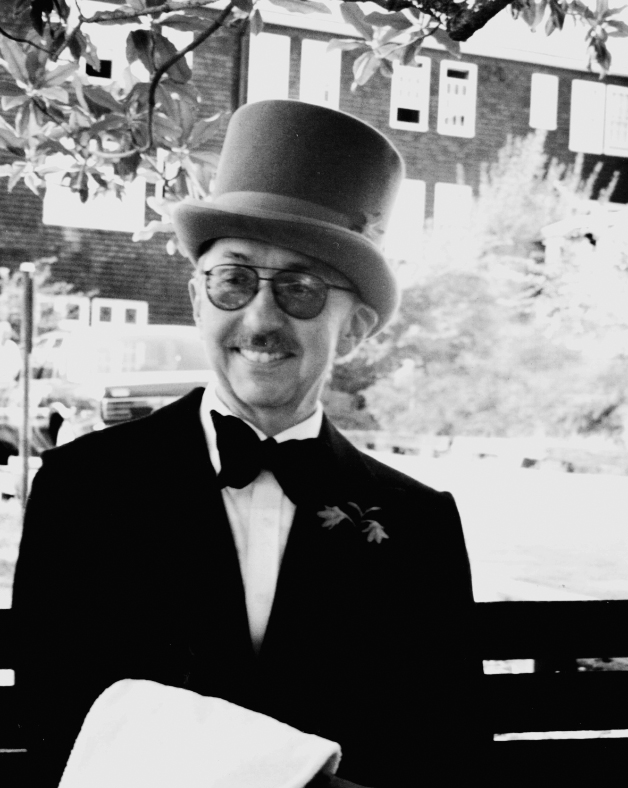
There have also been some wonderful concerts and Berkeley Festivals. In the ‘90s and early 2000s, I’d try to take a week off at work to go to everything I possibly could at the Festival-I’d go to the candlelight concerts, of which there were many on the Fringe. Just immersing myself in everything from Main Stage to Fringe was just amazing. Another highlight was, Nick McGegan and Mark Morris teaming up to do Platée. That was fantastic. I had the experience that I was going with Gene Morrow, president of the American Recorder Society, and one of us didn’t have a ticket. I can’t remember if it was he, or I. There were a couple of scalpers. I saw this guy and he asked if I needed a ticket and I said yes. He took me off campus across Bancroft, and sold me the ticket for not much beyond face value. So we went to hear the opera, and Gene still remembers that. When I saw him last he mentioned fondly his memory of me buying a scalped ticket. This was back in the day when the Berkeley Festival was co-produced by SFEMS and Cal Performances.
JHS: Tell us why SFEMS is important to you.
FF: It’s been really essential and an irreplaceable part of the development of my career as a professional early music educator, part-time arts administrator and support as a performer. I could not have done what I have done without SFEMS. My early music chamber group Flauti Diversi, was born, so to speak, at the SFEMS recorder Workshop in the early nineties.
PW: It’s my Musical community. It’s the place where I find people to play recorder with and make friends through that activity. The performances sustain my soul and the workshops are so important.
When I was President, Robert Jackson, Hanneke [van Proosdij] and I would go, hand in hand, begging for money at the Hewlett Foundation. Their question was always, “what is unique about SFEMS?” We would talk about SFEMS being a unique arts organization because not only does it have the performance side, but also it has this education program and the affiliate program. SFEMS’ ideal has been this capacious definition of who is the community; it’s not just the people who are going to perform, or the workshop directors, but its Affiliates and that sort of thing. I think that that emphasis has to remain. Part of the strands of SFEMS’ DNA includes education and performance and I think those strands need to stay strong because that’s what’s meaningful. It’s more than a performance-sponsoring organization. This activity of encouraging amateur musicians and providing the fertile ground for them to learn and excel; the market is poised for this to just jump off, I’m probably overly optimistic, but the idea that more and more people are retiring, that baby boomers are moving through that stage of their life and looking for things to do; they’re looking for hobbies and returning to their musical roots. The recorder especially is a fantastic doorway for them because it’s the easiest instrument to learn to make some sound on…You can get almost instant gratification by taking up the recorder. And the fact that many retirees are looking not only for an artistic outlet but a community, what better way to get that than join an ensemble, or start one.
The challenge for SFEMS, and for any classical music organization is the graying of the audience and the tapping of the Tech Community in a way that would resonate would hopefully curb that.
FF: It is very, very, very important that SFEMS continue with its education and affiliate programs. In a way, those two arms are more important than the concert series, because without the education programs, there’s not a future for the amateur musical community for a future for professional early music ensembles. Administrative support is essential for the Affiliates program and the educational support is essential for the amateur community and the developing of professional future professional players. Without the Musical Discovery [workshop] program you don’t have very young kids seeing early music as a possibility, and without the Baroque Workshop, you don’t have a summer workshop incubating future professionals in the same way that those workshops incubated future professionals who are now prominent early music musicians (Robert Mealy, Shira Kammen, et al.) who went to those workshops. Without realizing it perhaps, SFEMS has had an international impact through the development of these very prominent professional early musicians, but it wouldn’t have happened without the educational program or the concert series.
JHS: What are your hopes and dream for SFEMS?
FF: I would hope that it could become more financially self-sustaining. I would also hope that it would really foster its membership better, by reminding people to renew.
It would be ideal if SFEMS could continue its flavor and tradition as a Grassroots early music community. That’s really where it came from and how it developed. That has been what makes SFEMS unique. I think there is less community involvement now, and I’m not sure why. It would be my dream that SFEMS would retain that flavor. SFEMS is the only early music organization in the United States which is active in fostering education as well as professional development, in addition to a concert series. All other early music organizations in the United States do just one thing; just a concert series, or just workshops, or maybe just two of those things, but not all three. This is really SFEMS’ strength.
PW: An additional dream would be developing younger audiences; both for the workshops and concerts.
JHS: Have you found any commonalities in what motivates early music audiences, lovers and devotees?
FF: Anybody that I’ve met through early music is intellectually curious, and that motivates their outlook on life. They also have a passion for music and history. And usually they are, if not visibly eccentric in their outward appearance, they are eccentric in their innermost soul.
PW: And we mean eccentric in a good way.
JHS: Do you have any ideas for developing a younger and or broader audience?
FF: SFEMS needs to get with the times more, and open up to new ways of presenting early music and mixing it up a bit with other kinds of music. For instance, presenting in spaces other than church’s and concert halls; for instance, cafes and bars, and smaller, intimate venues.
PW: Well, SFEMS does have the concert series at the California Jazz Conservatory Café. And by the way, the recorder orchestra performed at the new Film Archive at the Berkeley Festival and it was fabulous. It was a great venue for us. It sounded good and people could walk in and hear the concert.
FF: I also think mixing up other ethnic traditions, like Arabic early music, or Scotch Irish early music, and even contemporary music. I know that SFEMS has presented at least one of these types of concerts, the Galax concert, but do more than one concert per season. The younger and broader audience, sadly, are not gonna come to a series made up wholly of baroque music played on string instruments. There’s another group, called Classical Revolution. They present classical chamber music in coffee shops and bars and as part of these pop up concerts.
JHS: Is there anything else you want to share with the SFEMS community?
Frances: To the community at large: please stay involved as a concert goer, workshop attendee, board member, donor, or ALL of the above. To SFEMS: Remember the many directors and staff members who have made the organization what it is through their hard work and time. People like Anna Carol Dudley, who directed the SFEMS Baroque Workshop for so many years, as well as Phebe Craig and Frances Blaker. People like Robert Dawson, one of the founding members of SFEMS, who also directed the Med-Ren workshop for so many years, as well as Tom Zajac and Hanneke van Proosdij. People from the community like Sally Blaker who have been on the board or involved with SFEMS since its inception. And past presidents like Kevin Fryer and John Dornenburg who worked so hard for so many years to steer the ship.
* * *
Share Your Story! SFEMS is hundreds of people like Frances and Priscilla, and like you and me, who have come by various paths to the love of early music. Some of you have been with us since the beginning, others have discovered this community only recently. Whether it was through attending our season concerts or the Berkeley Festival, learning about and making music yourself at one of our summer workshops, or helping build the Bay Area’s vibrant early music scene as part of a SFEMS Affiliate group, your participation and your dedication to cherishing and enacting these treasures from our musical heritage are what sustains our mission. Your stories and experiences, your insights and epiphanies, are important to us, because they illuminate our path forward. Please tell us how you came to early music and what early music and SFEMS have meant to you. All those who take our survey will be eligible to win a pair of free tickets to our fabulous, February concerts featuring ARTEK performing Monteverdi’s seventh book of madrigals.

